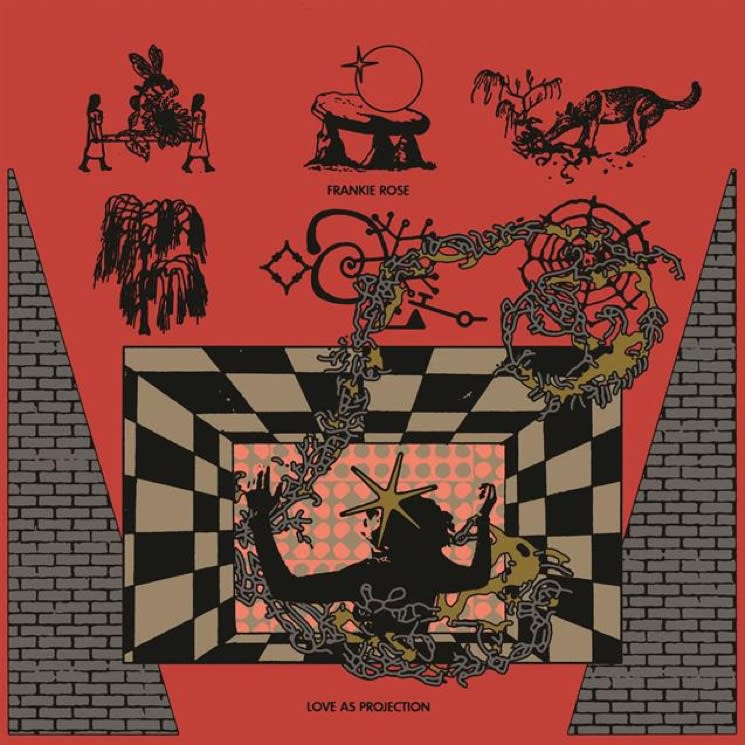Frankie Rose used to be the ringer of Brookyln indie rock, serving time behind the drums in buzz bands Dum Dum Girls and Crystal Stilts, and writing Vivian Girls' best song ("Where Do You Run To"). And as the scene that she was once so pivotal to has faded, Rose has also taken a step back: it's been six years since her last proper album, 2017's Cage Tropical, by far her longest break between projects.
With Love as Projection, she returns to the familiar sound of indie pop's circa-2009 halcyon days, slathering reverb onto dreamy arrangements that blend pulsing beats with twinkling synths and soaring dream pop hooks. The album recalls the soundscapes of 2012's Interstellar, an album that saw Rose moving beyond her scrappy indie rock influences into a sparkling sound full of '80s new wave synths.
The thick reverb means that the lyrics rarely jump out, as Rose uses her voice more as an instrument than as a way to communicate lyrics. The hymnlike keyboard ballad "Feel Light" is a two-minute symphony of overlapping voices, with Rose densely harmonizing and singing her own countermelodies within a whooshing digital soundscape. The goth pulse of "Sixteen Ways" is clearly the work of someone who once covered an entire album by the Cure, but the cascading waves of layered harmonies in the chorus are pure Rose.
It's very pretty, but Love as Projection's best moments come when she picks up the tempos and tones down the gauziness ever so slightly. In particular, the single "Anything" is a pristine piece of bouncy '80s pop, its sublime synth melodies contrasted by lyrics that highlight moments of human connection amidst the chaos of modern life: "The world around you is always on the brink / I bought some groceries and put them in the cupboard."
With so much reverb and pillowy synths covering practically every moment of Love as Projection, the songs begin to blur into one, even with a relatively streamlined 10-song tracklist. This isn't an album of contrasts but a vibe to get immersed in, and it's a welcome reminder of what once made Rose one of the key figures in indie rock.
(Slumberland)With Love as Projection, she returns to the familiar sound of indie pop's circa-2009 halcyon days, slathering reverb onto dreamy arrangements that blend pulsing beats with twinkling synths and soaring dream pop hooks. The album recalls the soundscapes of 2012's Interstellar, an album that saw Rose moving beyond her scrappy indie rock influences into a sparkling sound full of '80s new wave synths.
The thick reverb means that the lyrics rarely jump out, as Rose uses her voice more as an instrument than as a way to communicate lyrics. The hymnlike keyboard ballad "Feel Light" is a two-minute symphony of overlapping voices, with Rose densely harmonizing and singing her own countermelodies within a whooshing digital soundscape. The goth pulse of "Sixteen Ways" is clearly the work of someone who once covered an entire album by the Cure, but the cascading waves of layered harmonies in the chorus are pure Rose.
It's very pretty, but Love as Projection's best moments come when she picks up the tempos and tones down the gauziness ever so slightly. In particular, the single "Anything" is a pristine piece of bouncy '80s pop, its sublime synth melodies contrasted by lyrics that highlight moments of human connection amidst the chaos of modern life: "The world around you is always on the brink / I bought some groceries and put them in the cupboard."
With so much reverb and pillowy synths covering practically every moment of Love as Projection, the songs begin to blur into one, even with a relatively streamlined 10-song tracklist. This isn't an album of contrasts but a vibe to get immersed in, and it's a welcome reminder of what once made Rose one of the key figures in indie rock.
